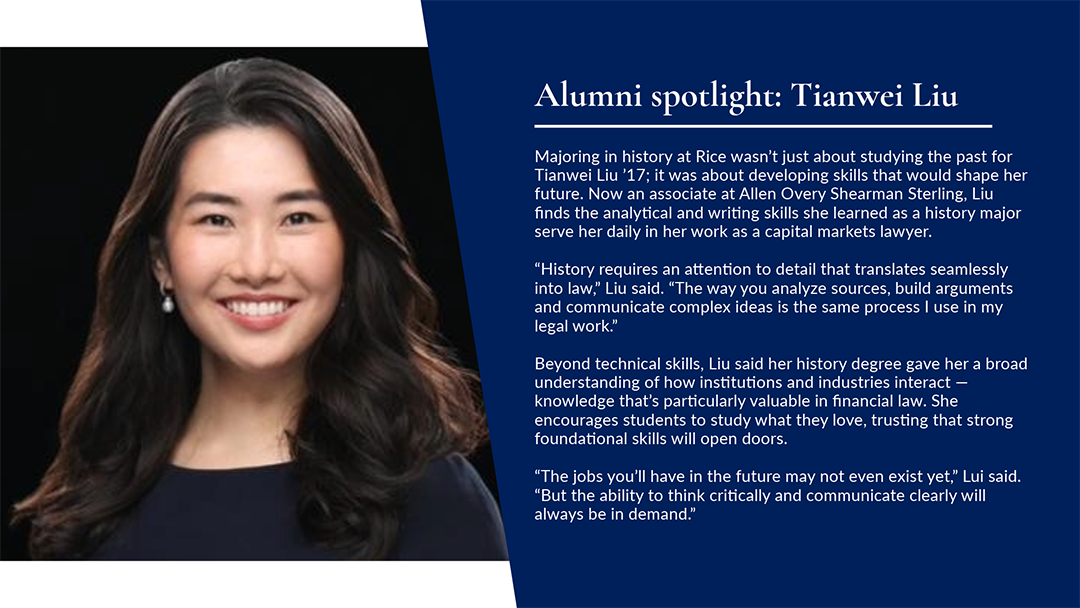The study of history can be much more than just memorizing names and dates. At Rice University, history students engage in original research, collaborate with faculty on high-level scholarship and contribute to ongoing academic debates. Through archival work, seminar courses and student-led publications, they are not just studying history; they are helping to shape it.
“Everything has a history — history is for everyone,” said Nathan Citino, the Barbara Kirkland Chiles Professor of History and chair of the Department of History, quoting Rice colleague Aysha Pollnitz.
History students have access to a wealth of research opportunities that mirror professional academic work. For example, through the Ira and Patricia Gruber Research Fund, history majors are able to travel across the United States and internationally to conduct original research.
“We’ve sent students to the National Archives of the United Kingdom, to countries in Latin America, to archives in Washington, D.C.,” Citino said. “We have the resources to fund that research here right now. It’s not something they have to go out and raise on their own. It’s here.”

The department also houses the Rice Historical Review. The student-edited journal provides undergraduates with an opportunity to publish peer- and faculty-reviewed work.
“It’s a beautifully produced, printed journal that has been going for several years now,” Citino said. “We’re really proud of it. It’s mostly Rice students who contribute, but they also solicit undergraduate submissions from other institutions.”
At the course level, research is embedded in the curriculum. The department’s 400-level seminars function as research workshops in which students analyze primary sources and engage in contemporary academic debates.

“I’m teaching one right now on the United States’ role in the Middle East, which is pretty timely,” Citino said. “Students aren’t just passively consuming knowledge; they’re actively helping to produce it.”
Beyond research, a history degree equips students with essential intellectual tools that serve them in a wide range of careers.
“The ability to discern, to critically analyze, to evaluate and assess — those are the skills that come out of a history degree,” Citino said.
In an era of rapid technological change and an overwhelming amount of digital information, these skills are more crucial than ever. Historians are trained to interpret complex data, recognize bias and communicate findings clearly, making them valuable in fields ranging from law to business to public policy.

“The ability to render complex subjects understandable and accessible to a nonspecialist audience is the necessary art for succeeding in whatever you go on to do,” Citino said.
The history program at Rice also offers students a highly interactive learning environment. With courses capped at 15-25 students, faculty members work closely with students to refine their research and writing skills.
“I have a file on my hard drive with drafts of student papers,” Citino said. “The longer that list is, the more successful I regard the course. It’s evidence of students working on clarity, organization and synthesis.”

The department’s commitment to faculty mentorship extends beyond the classroom. Professors regularly support students in their postgraduate ambitions, writing personalized letters of recommendation and providing career guidance.
“I write a lot of recommendations for law school, grad school and whatever comes next,” Citino said. “Because I’ve worked so closely with students, I can talk in specific terms about their growth, their research and the contributions they’ve made.”

History at Rice is not confined to students majoring in the field. Many undergraduates in STEM and social sciences find themselves drawn to history courses that intersect with their primary disciplines. The department offers thematic courses in the history of science and technology with Luis Campos, the Baker College Chair for the History of Science, Technology and Innovation, and associate professor Elizabeth Petrick. Students can study Africa with assistant professor Nana Osei-Opare, Latin America with assistant professor Laura Correa Ochoa, medical humanities with associate professor Chin Jou, Palestinians with associate professor Abdel Razzaq Takriti and race in the U.S. with associate professor Daniel Domingues da Silva and Caleb McDaniel, the Pulitzer Prize-winning Mary Gibbs Jones Professor of Humanities. These connections provide students in technical fields with a broader perspective on their work.

“My wife, Sharon, is an attorney,” Citino said. “She works with engineers in city management, and for her the key thing is explaining why the data matters. That’s exactly the kind of skill we teach in history: translating expertise into something that has broader meaning.”
In a world defined by uncertainty and transformation, studying history provides a foundation for adaptability.
“Historians don’t like to predict, but there is one thing we can predict: Change is coming,” Citino said.
From political and environmental shifts to cultural evolution, understanding historical contexts prepares students for lifelong learning and professional flexibility. Rice History graduates have pursued careers in government, journalism, consulting and academia, applying their skills to fields far beyond the traditional historian’s path.
“One of the most rewarding aspects is watching students take these skills into vastly different careers,” Citino said.


